MAVERICK CITIZEN
Zimbabwean boy mauled by hyena is on his way to becoming a kid again
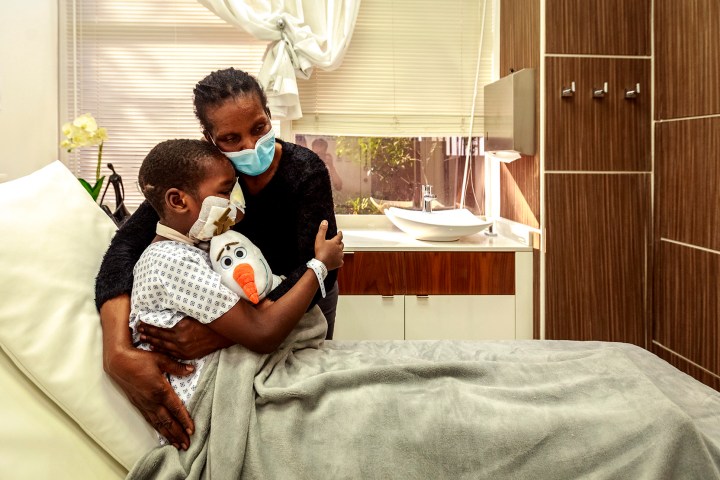
Rodwell Nkomazana’s road to recovery isn’t easy, but he has a lot of good people helping him along the way. ‘Yes, this thing happened to him,’ said his speech therapist, ‘but it doesn’t define him. He is still Rodwell… he wants to be a kid.’
Nine-year-old Rodwell Nkomazana was mauled by a hyena just outside of Harare, Zimbabwe in early May and flown to Johannesburg for life-saving reconstructive surgery and rehabilitative care in June.
At Mediclinic Sandton, Rodwell underwent several surgeries which entailed the reconstruction of his left eye orbit, his upper lip and cheeks. These surgeries will also assist in the facilitation of a prosthetic eye and nose.
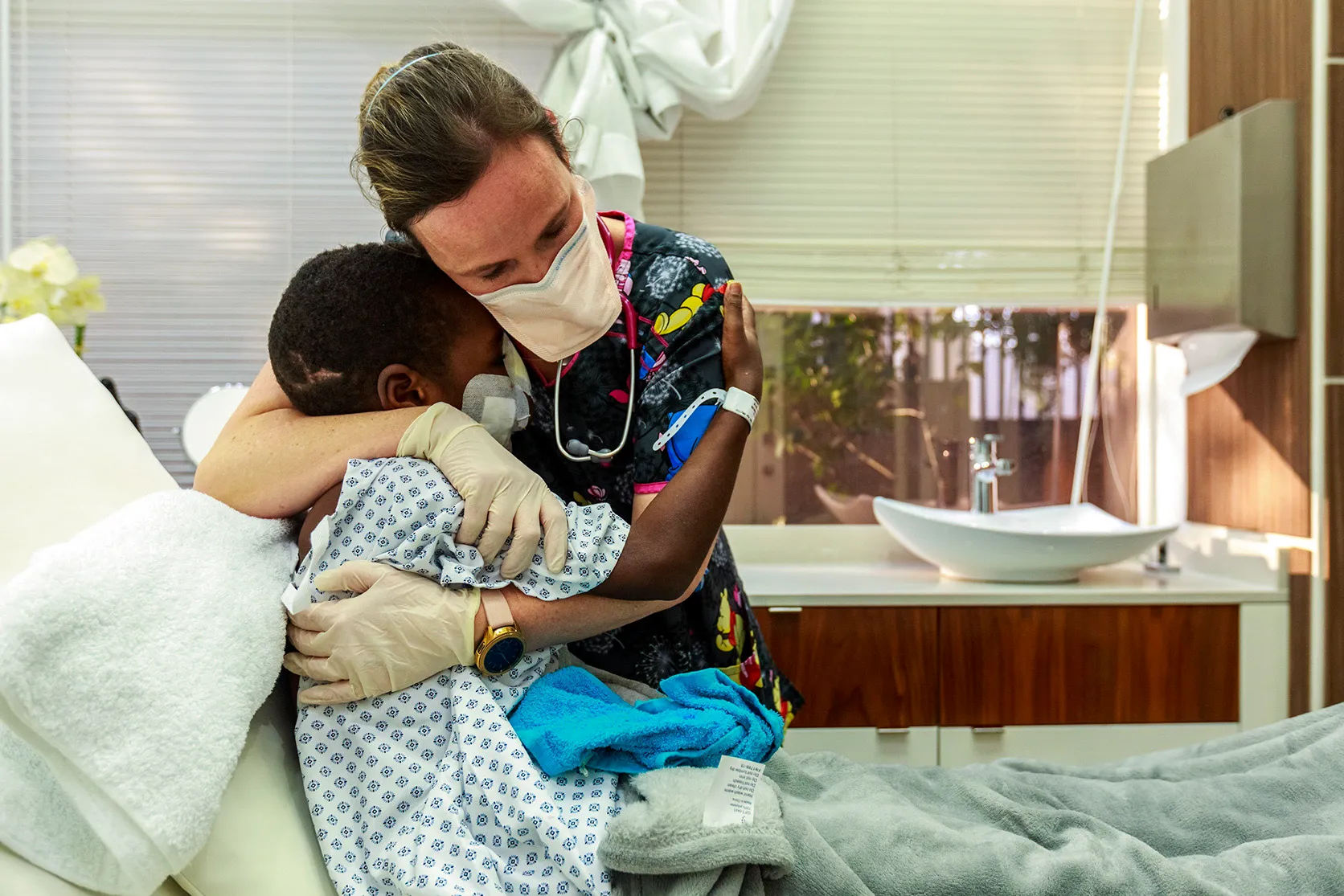
Rodwell Nkomazana with paediatrician Dr Kim Barnard who was Rodwell’s chief carer and oversaw all his care. (Photo: Julian van Jaarsveld via Smile Foundaion)
Rodwell was discharged from hospital on Sunday, 15 August, but will remain in South Africa for several more weeks with his mother, Shamiso Mabika, to complete his rehabilitation treatment and therapy.
Maverick Citizen spoke to Rodwell’s multidisciplinary rehabilitation team this week to find out how he is doing and what’s next on his road to recovery.
Rodwell’s physiotherapist, Caitlin Leslie, from Sue Naude Physiotherapy, has been with Rodwell from early on, right after ear, nose and throat surgeon Dr Razvi Ahmed performed a tracheostomy (a procedure in which a tube is inserted into the windpipe) on 21 June, to allow the surgeons better access to Rodwell’s face while they were working on it.
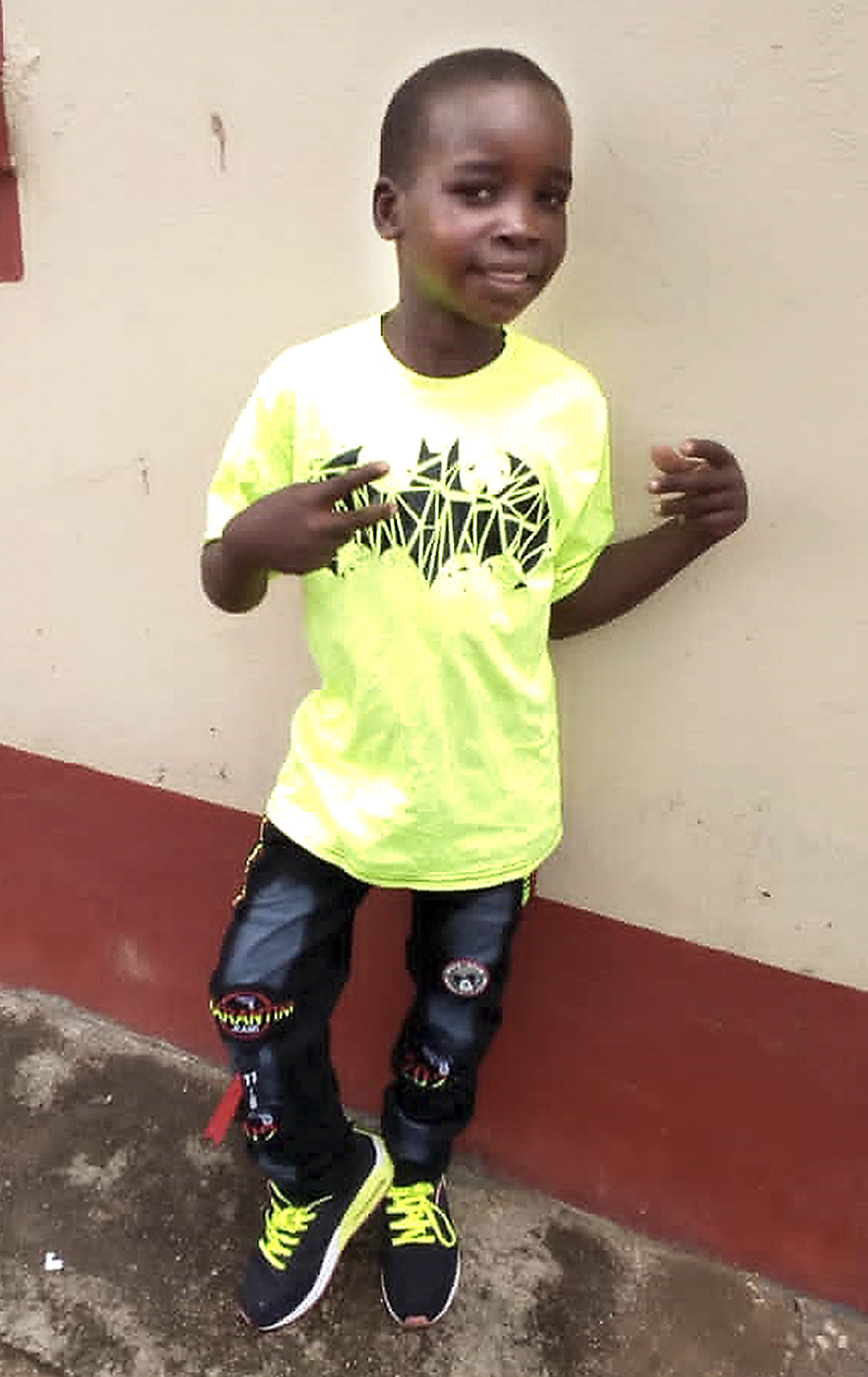
Funds are being collected for Rodwell Nkomazana’s medical treatment, pictured here before he was mauled by a hyena on 7 May. (Photo: Supplied)
Leslie explained that because the tracheostomy tube bypasses his normal ways of breathing and coughing, she performs chest physio on Rodwell and suctions out the secretions and mucus so that they don’t build up in his lungs.
Additionally, Leslie’s role has included mobilisation and working with occupational therapist Kathryn Nish on balance and depth perception as Rodwell’s left eye was removed after the attack.
“Rodwell now has monocular vision as he lost his left eye,” explains Nish, “this affects depth perception and visual field. Your ability to manage stairs, search for objects in a cluttered drawer, scan your environment and perform tasks like pouring water into a cup and catching a ball can be challenging.
“It’s about retraining that and using environmental cues to get that depth perception back. And he’s doing that all very beautifully now. He can catch a tennis ball, so he’s doing very, very well.”
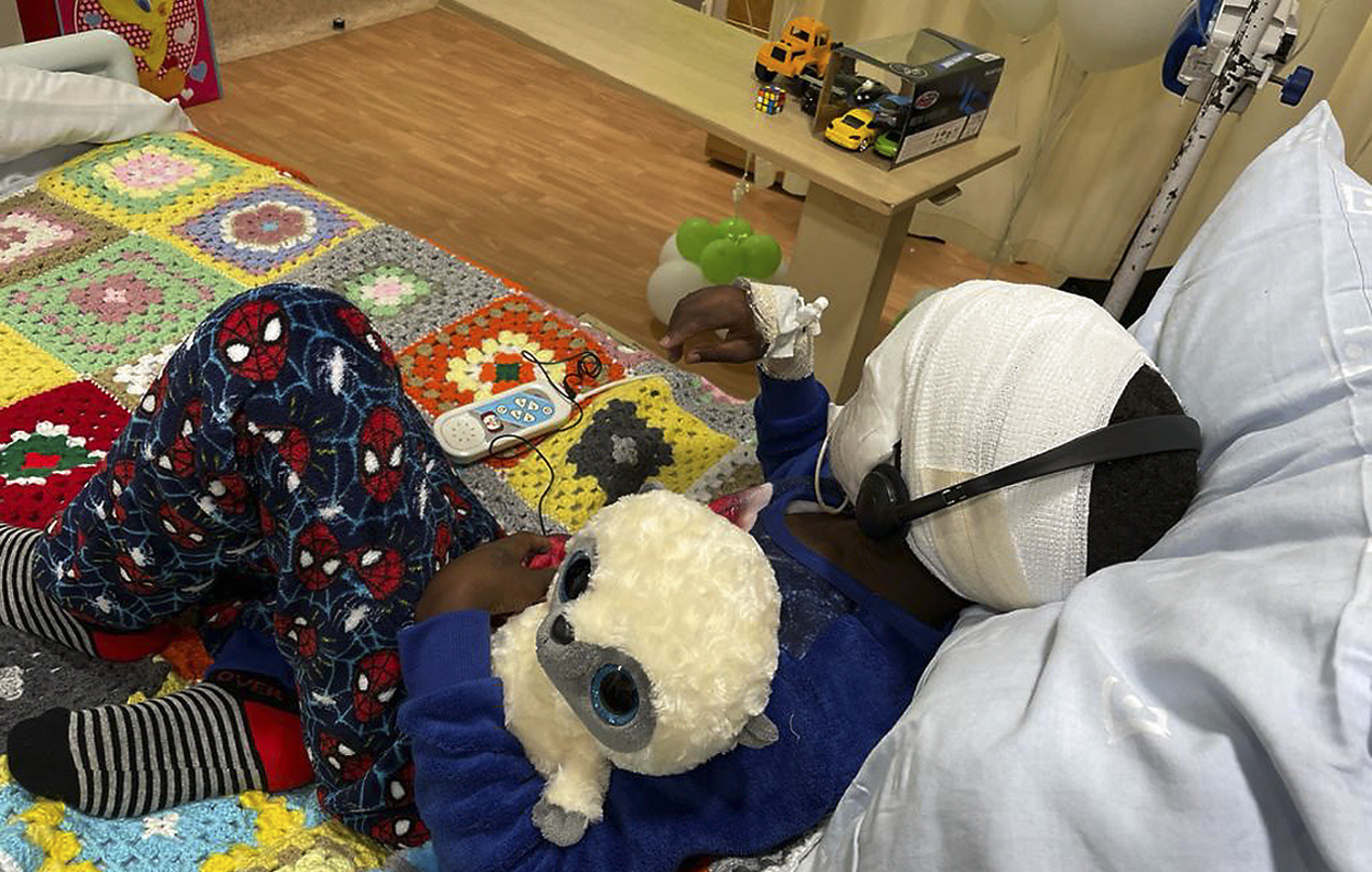
Rodwell watches ‘Mr Bean’ in the Mediclinic Sandton Paediatric Ward, Johannesburg, in June. (Photo: Maqshuda Kajee)
Nish’s role also includes play therapy. “My major role was to get Rodwell back into being a kid again, and to take him back to being involved in play.
He’s a really studious little boy… but there’s only so much homework that a child can or should be doing, and the rest should be playing.”
Nish worked during the early phases of Rodwell’s OT treatment, and now Vivienne Schmidt, a physical rehab OT, who represents McCulloch, Harrison & Partners: RehabMatters (the company that is providing the service pro bono), has started working with Rodwell.
Schmidt’s role is to work on Rodwell’s scars and wounds; to make facial and jaw movement easier, to help with itching and the aesthetics of the scarring.
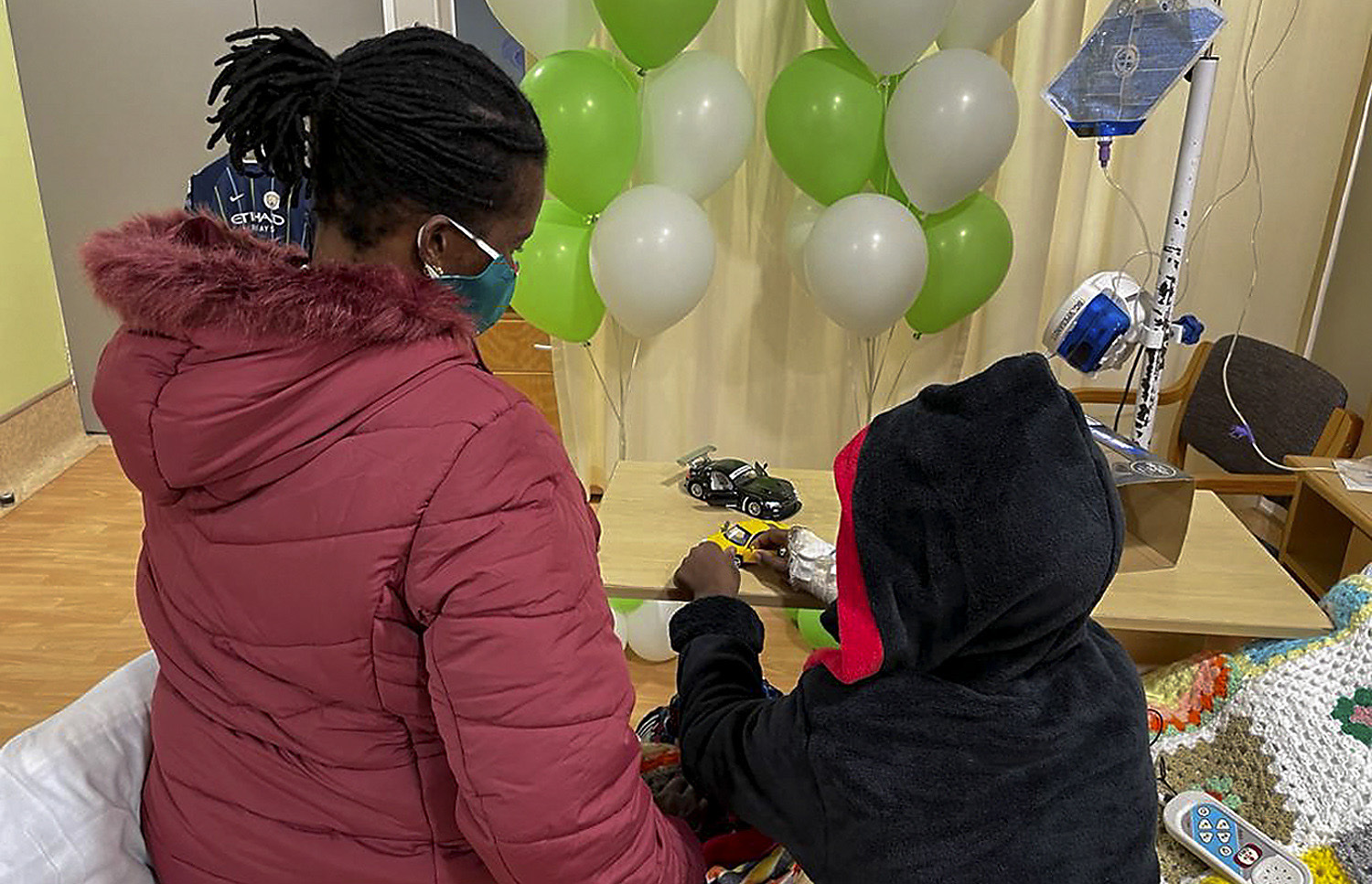
Rodwell at play with his mother at the Mediclinic Sandton Paediatric Ward. (Photo: Maqshuda Kajee)
Schmidt says, “You have two years after an operation for scars to be fiddled with and managed and made to look more like your skin.
“So instead of having these big, bulky, hard scars; with scar massage, with pressure garments, we can make them nice, soft, a little bit more flexible than what they are at the moment, and a lot more like his normal skin.”
Speech therapist Andrea Fourie’s role is to help Rodwell with eating and speaking, which is going to be one of his biggest challenges as he basically has to relearn how to do that.
Fourie explains that due to the reconstruction of his jaw and upper lip, Rodwell doesn’t have a lot of control when eating, so he is only able to eat soft, puréed foods. Fourie is working on slowly introducing different textures. However, to reach his calorie goal, Rodwell still needs to get nutrition through the percutaneous endoscopic gastrostomy tube which goes into his stomach.
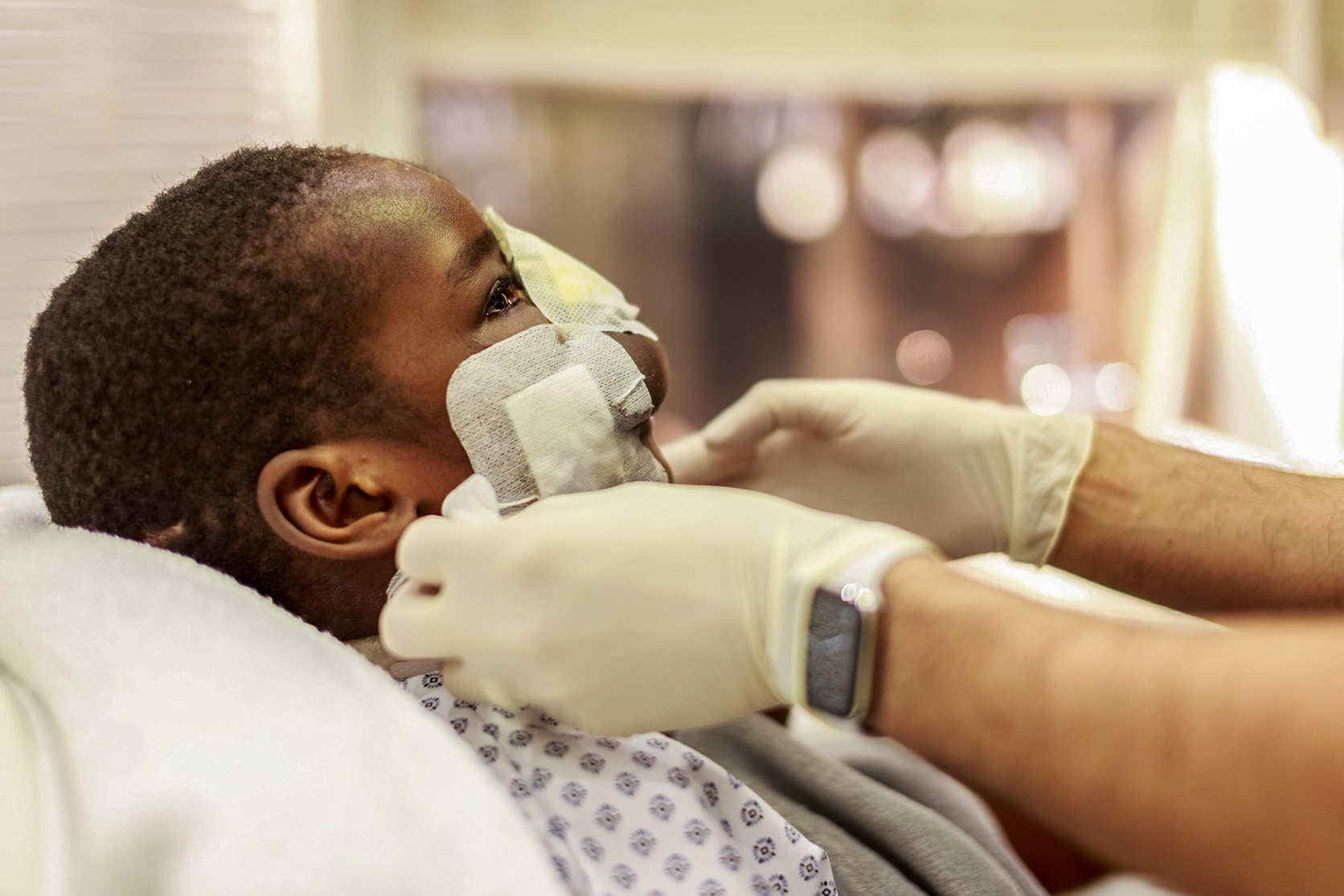
‘Yes, this thing happened to him. But it doesn’t define him. He is still Rodwell,’ says Rodwell’s speech therapist Andrea Fourie. (Photo: Julian van Jaarsveld via Smile Foundaion)
Jeske Wellmann, Rodwell’s dietitian said, “He needs to be able to get enough nutritional support for optimum recovery. These products are costly as he is reliant on them for all his nutritional intake. He can eat very small amounts orally, but not nearly enough to sustain him.”
Fourie’s role also includes helping Rodwell with speech articulation and pronunciation, because he is still learning how to use his upper lip from a speech point of view.
“So he still sounds quite unusual and different, just because of both the reconstruction that they’ve done, but also the fact that his voice is not the same because of the trache [tracheostomy tube].”
Fourie’s goal is to get his speech to be as clear as possible, “so that he is able to be understood by a range of people that he’s speaking to, and so that there isn’t frustration from his part”.
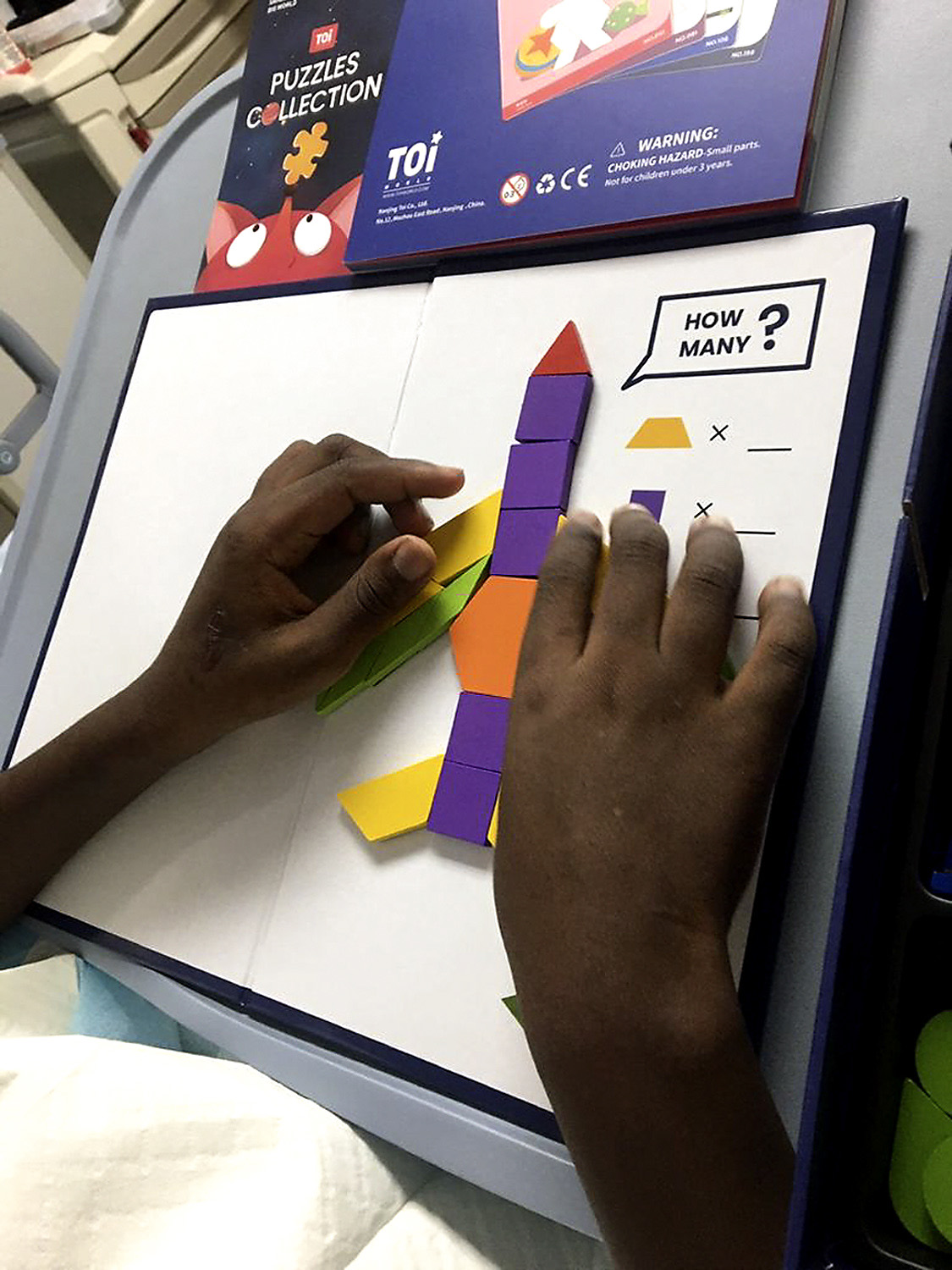
Rodwell completes a maths activity. His rehab team says he’s diligent with his schoolwork. (Photo: Rehabilitation team)
Lauren Freese, Rodwell’s psychologist, said that despite his age, the reality of the situation is very apparent to Rodwell.
Freese’s role has focused on making him feel like a normal boy again. “My job has been around normalising him, making him feel like it’s okay to be angry. It’s a lot around communicating needs, normalising feelings, and facilitating that play as well.”
Freese is also working with Rodwell on self-acceptance and dealing with how the public will respond to him.
“Up until now he’s been fairly sheltered in the hospital environment because there you’re expecting to see people with different challenges. When he goes out into the real world, people will respond differently. So, I think that’ll be a big challenge for him and his family.”
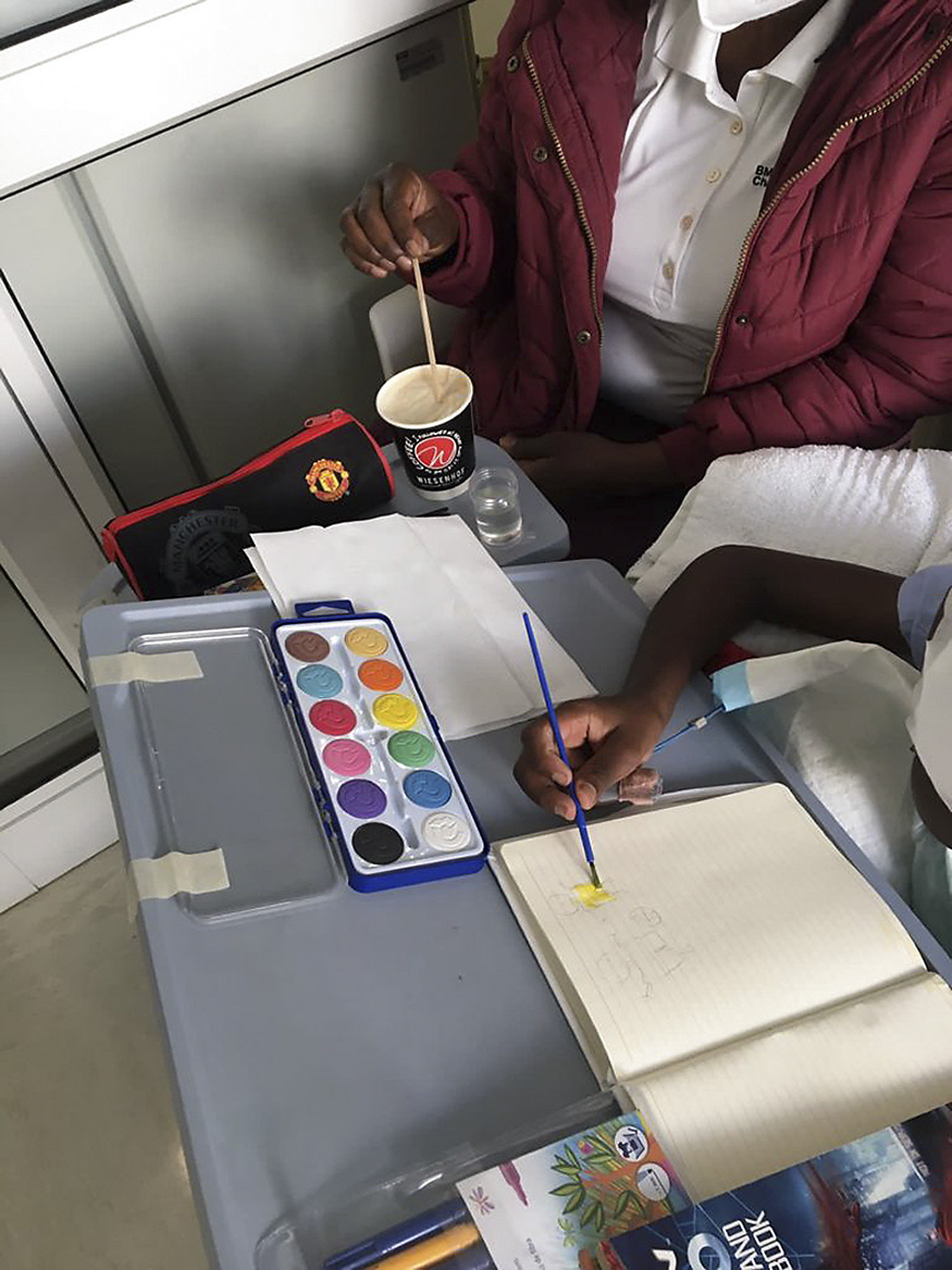
Rodwell paints with his mom beside him. ‘Ultimately kids just want to be kids. And I think, the crux of it all, is that their spirit is resilient,’ says speech therapist Andrea Fourie. (Photo: Rehabilitation team)
Coping mechanisms and skills she’s worked on with him include role-playing scenarios of how people will react and building his confidence and preparing him for what may come.
“It’s around just being confident enough in the way he looks, which he actually is pretty confident, which is great.”
Freese’s role has also included working with Rodwell’s mother, Shamiso Mabika, helping her deal with the trauma and facilitating the relationship between her and Rodwell.
Wellmann says, “He and his mom are the most appreciative people I have seen in a long time, they always have a smile on their faces and in their eyes.”
Freese said about Mabika, “I think she’s a mom in a very tough situation. But she’s incredible, she’s incredibly strong. And yeah, I think she’s doing what every mum would do in this situation. And she can be commended for that.”
Freese is working on making Rodwell and his mother’s relationship more playful, “so that she feels more comfortable to come in and that it was okay for them to all be giggling.
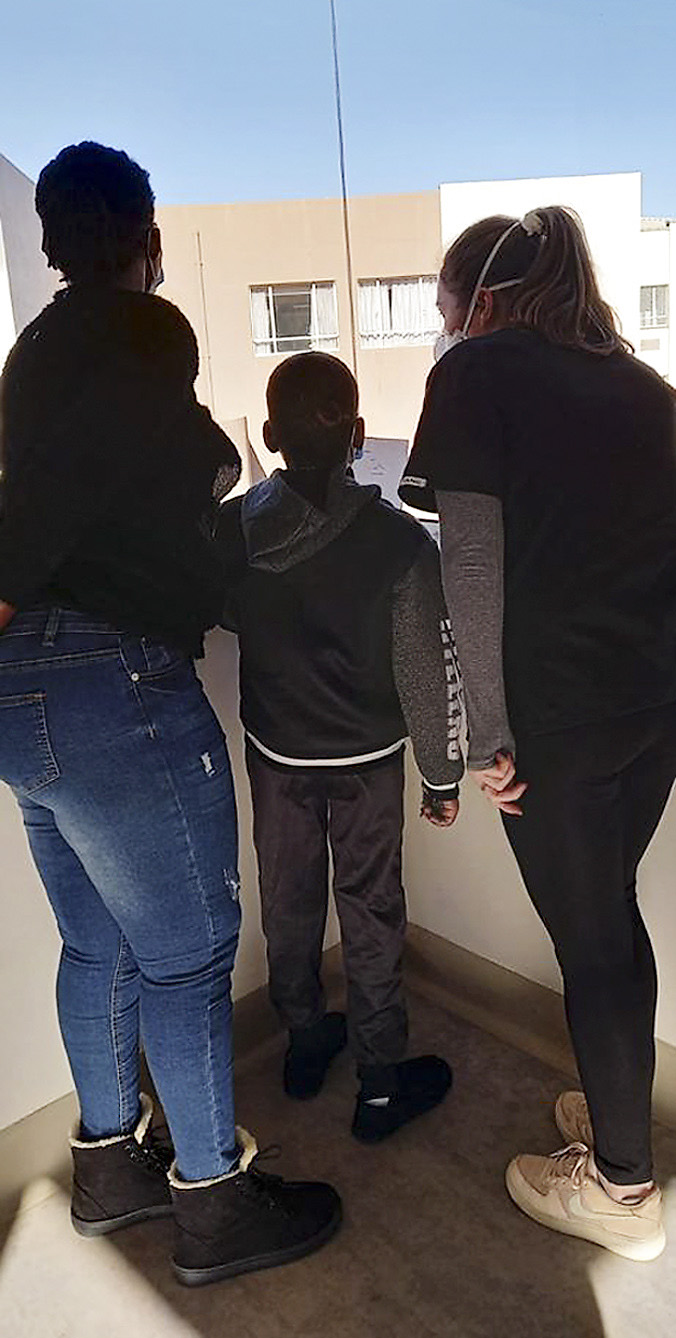
Rodwell looks out of the window at Mediclinic Sandton for things on his treasure hunt list given to him by his occupational therapist Kathryn Nish. His mom, Shamiso Mabika (left) and physiotherapist Caitlin Leslie (right) look with him. (Photo: Rehabilitation team)
“I mean, we giggle ourselves silly with this child. For our farewell thing for him on Friday, he had a bit of a cupcake, and he wanted us all to have a cupcake and so we had to take our masks off to eat — it’s the first time he’d seen our faces, and we giggled and giggled and giggled. So, it’s just about creating some sense of, it’s not all bad.”
Everyone on the rehab team said what surprised them most about Rodwell was how mischievous he is.
Leslie tells a story that describes Rodwell’s character very well: “I took him down to his mom’s room one morning. He kind of tells you where he wants to go and he takes you,” she says smiling, “and we got there, we played a little bit of soccer. He was in a great mood. He was chatting to mom and showing us around.
“And then on leaving he found her fruit basket in the corner of her room. He spotted a banana and he just locked eyes on it. He grabbed the banana and I looked at him and I said, ‘Rodwell, you know, you’re not allowed to eat the banana… it must be soft.’ ”
Leslie explained that Rodwell had just had surgery two days before and was allowed to eat only pureed foods and liquids. She told him he had a smoothie upstairs which had a banana in it that he could have instead.
“He looked at me and he was a little bit upset, but I thought he understood,” Leslie says laughing. “And then I went next door to treat my next patient and 15 minutes later came out of the room and he’s sitting eating his banana! He’s broken it up into tiny little mushy pieces and he is in his element. I have never seen him with such a grin on his face.”
Leslie adds, “When he’s very excited, he stomps his feet a few times, it looks like a little jiggle. And he did that while he was eating his banana.”
Freese jumps in with another example of Rodwell’s sense of humour and mischief, telling the story of how directly after that, during play therapy Rodwell made a banana out of yellow playdough and pretended to eat it, and they both were left in a fit of laughter.
“The reality is very much there,” continues Freese, “he sees himself every day. You know, he’s not closed off to the fact that he looks different, and he sounds different, but we’ve just normalised it for him. This is what it is now, bud, and you’re going to be fine. And sort of just giving him coping skills for that.”
Freese said that what surprised her about Rodwell, besides his mischievous side, was his resilience.
“He can have some huge surgery and be told that he’s not allowed to eat again. And you know, he’s disappointed and he’s sad,” explains Freese, “but five minutes later, he’s kicked back into happy.
“He’s just inherently a happy kid. And ja, that really surprised me. You know, we have this trauma sort of banner that we hold up and you’re expecting a certain response and actually, he’s just so great. He’s just so happy all the time. And when he’s not, he’s not. But then he is okay again, like any typical kid.”
Fourie agrees: “Ultimately, kids just want to be kids. And I think, the crux of all that is, their spirit is resilient. They are incredible little humans. And I think they just want to be kids.
“Yes, this thing happened to him. But it doesn’t define him. He is still Rodwell. And he’s a little boy whose feet tap when he gets excited. Who steals bananas, who has a very mischievous giggle. I think that’s it. I think that he wants to be a kid.”
The Smile Foundation has taken over the fundraising campaign from MEAL SA and is still in desperate need of donations to cover Rodwell’s ongoing medical expenses.
You can donate here: Help Rodwell
However, all members of Rodwell’s surgical and rehabilitation team donated their services pro bono.
Nish and the rehab team agreed that after surviving the brutal attack and all the campaigning it took getting him here, offering their services pro bono was a no-brainer.
Freese added, “When you’re working so directly with someone, you kind of become the focus — so ‘the rehab team’ and ‘the medical professionals.’ But there’s so many people behind the scenes that are doing so much… like, donations of toys, you know, or mom’s care packages. I think that the community in general has just been amazing.
“And it’s just such an indication of the spirit of this country, actually. We’ve been through such a trying period and still people step up, and they help where they can.” DM


















 Become an Insider
Become an Insider
Comments - Please login in order to comment.